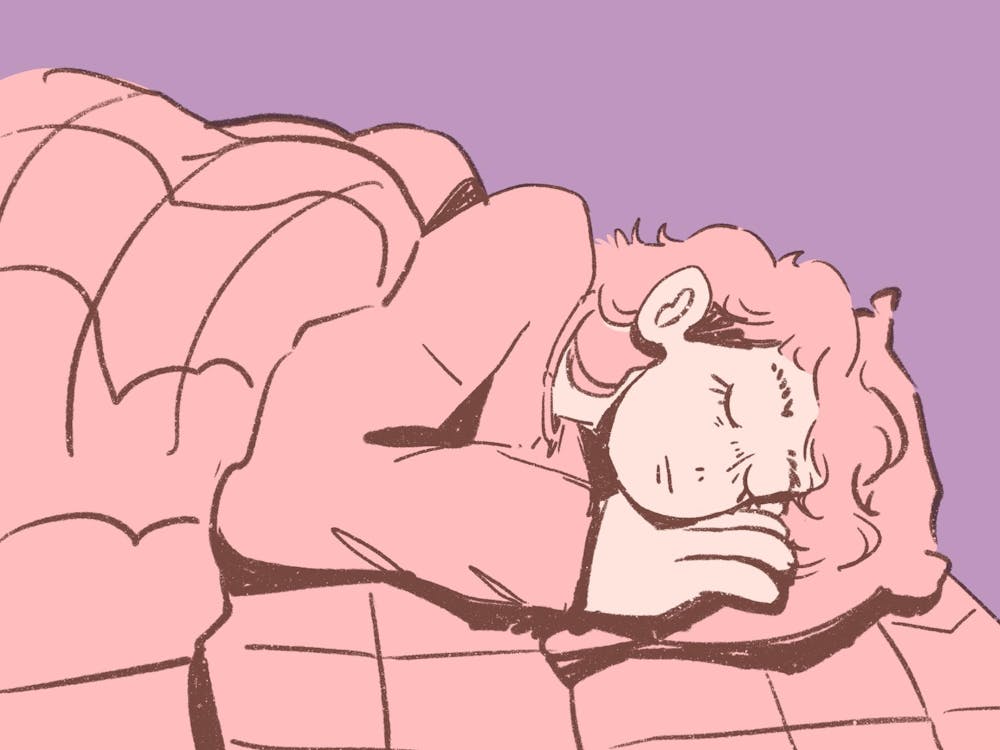This is the third in a series of articles about the science of various aspects of college life.
Around 70% of college students report getting less than eight hours of sleep a night. With looming deadlines, buzzing social events and uncomfortable dorm environments, it can be difficult for students to wind down and head to bed at a reasonable time.
But researchers say the long-term effects of poor sleep habits can be detrimental to overall health and learning.
“For almost every function of the brain and the body, there’s some aspect of it that seems to be supported by a good night of sleep and impacted by a bad night of sleep,” said Jared Saletin, the associate director of the Emma Pendleton Bradley Hospital’s Sleep Research Laboratory.
With how important a good night’s sleep is, what actually happens to the brain and body when students finally crash for the night?
Sleep consists of approximately 90-minute cycles composed of two stages, Saletin explained.
Non-rapid eye movement sleep, which comprises approximately 80% of the cycle, plays a crucial role in memory consolidation, physical repair and restoring cognitive function.
During rapid eye movement sleep, which comprises the remaining 20% of the cycle, the body restores its metabolism and appetite functions, strengthens its immune system and supports emotional regulation, Saletin explained. Dreams also occur during this phase, which is why REM sleep plays a role in supporting creativity, he added
“REM sleep seems to favor (thoughts) that are very far from each other in your experience, and one of the benefits of that is the ability to stitch dots together that otherwise would not be put together,” he said.
Further, studies have shown that sleep plays a critical role in clearing the brain of amyloid plaques — clumps of protein fragments that are commonly associated with Alzheimer’s disease, Saletin added.
While these 90-minute cycles govern the processes of the brain and body while sleeping, two factors biologically drive people to go to sleep in the first place: sleep homeostasis and the circadian rhythm.
Sleep homeostasis, the body’s drive to sleep, builds during waking hours and decreases during sleep. This drive is controlled by adenosine — a neurotransmitter that promotes the feeling of sleepiness — by activating certain neurons that restrict the release of chemicals that promote wakefulness, such as dopamine and norepinephrine.
On the other hand, the circadian rhythm relies on the body’s natural light-dark cycle. By responding to environmental cues such as light and temperature, the body is biologically programmed to sleep at night regardless of where an individual is in their sleep drive cycle, Saletin said.
So, students who stay up too late — regardless of whether they took a nap during the day or how much they slept the night before — can experience short-term effects the next day, including “impaired reaction time, mood and alertness,” Saletin said.
William Stone ’27 said that “on the days when I don’t get as much sleep, I definitely don’t feel as rested and typically not as productive.”
Stone added that they believe academics and nighttime social events are some of the biggest contributors to poor sleep hygiene among college students.
Nighttime is “when you know everyone’s got no class, and so it’s the easiest time to meet up,” Stone said.
BWell offers sleep hygiene resources — including a self-assessment quiz — to students struggling to get the recommended seven to nine hours of sleep.
Additionally, Brown Sleep Society promotes the importance of quality sleep through events such as semesterly workshops centered on sleep hygiene and lucid dreams.
“Our mission is to promote awareness of the importance of sleep to pretty much all aspects of student life, both academically and physically, as well as just teaching people how to better control their sleep,” said Edward Shen ’26, co-president of Brown Sleep Society.
While simply sleeping more is one way to improve sleep hygiene, Shen says there are many other healthy sleep habits that many students are unaware of, which they can learn through the Sleep Society’s workshop offerings.
“Everyone is constantly trying to do as much as they can balancing academics, socialization, extracurriculars, research, everything,” he said. “But (students) underestimate the effect that a good night of sleep has on long-term health and their actual performance and the activities they care about.”
In the long term, poor sleep hygiene has been associated with depression, cancer, Alzheimer’s and numerous other health consequences, Saletin said. He added that while one bad night of sleep will not “rock the long term arc,” maintaining healthy sleep habits is beneficial to good health in the aggregate.
“Not every day is going to be perfect, but if you prioritize sleep, it’s going to help your physical and your mental health in the long run,” Saletin said.
Jonathan Kim is a senior staff writer covering Science and Research. He is a first-year student from Culver City, California planning to study Public Health or Health and Human Biology. In his free time, you can find him going for a run, working on the NYT crossword or following the Dodgers.





